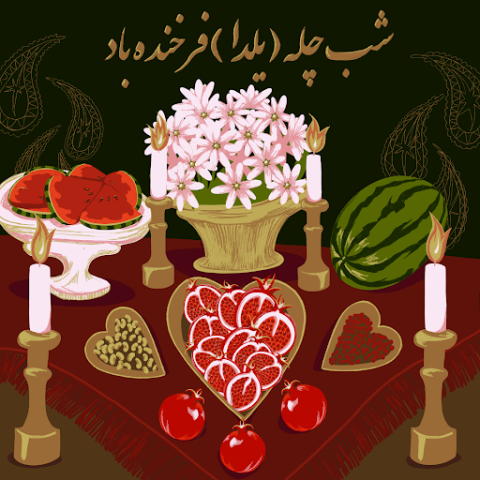
Designed by: Grace Adams ©
Shab-e Yalda, or Shab-e Chelle, known in English as Yalda Night or Chelle night is an old Iranian festival celebrated on the winter solstice. In the Georgian calendar it usually falls on the night of December 20th or 21st (±1).
In the Iranian calendar this is the last night of the ninth month, Azar, and also the last night of Autumn. The sunrise brings the first day of Winter—the first day of the month Dey.
The festival is still observed yearly in Iran and in what is known as the older Persian Empire or Eranshahr (The Country/City of Iran). These are countries which neighbour Iran; such as Afghanistan, Azerbaijan, Tajikestan, Turkmenistan, parts of Uzbekistan, and also Kurdistan regions of Turkey, Syria, and Iraq.
At the last night of Autumn, family and community members gather together and celebrate the Yalda Night. During the festival they usually set a table with pomegranate, watermelon, wine, dried nuts, candles, flowers, Hafez Shirazi and Ferdowsi books. Some families wait for the sunrise to see the victory of light over darkness and the renewal of Sun.
Most elements of the Yalda Night table are red, representing fire, and light. Pomegranate and watermelon, have their own meanings; the outside of the pomegranate represents dawn, the inside off the pomegranate represents the glow and radiance of life and the watermelon represents sun and health. “I can remember my Grandma telling me during the Shab-e Chelle that if we ate watermelon, we wouldn’t get ill during the winter. For us, It was seen almost like a flu vaccine!”
In old Iranian culture respecting nature and what it can provide was one of the fundamental beliefs of Iranian families. Today it is still a key belief amongst the more traditional families and also amongst the Zoroastrians—the followers of the oldest organized monotheistic faith.
Even after the Arab/Islamic Conquest of Persia, from 633 to 654 AD, Iranians kept their pre-Islamic traditions. Specially within the Zoroastrian community; in the old days Chelle/Yalda night was treated as more of a religious event amongst the Zoroastrian community, as a battle of Darkness and Light, they also recited Mehr Yasht, and carried on the old Persian traditions.
While the first day of each month in the Zoroastarian Calendar is Ourmazd–a day which belongs to Ahoora Mazda, the God of Wisdom. The first day of winter was also a big celebration as victory of Light over Darkness (Ahriman). This day was also called Khorram Ruz (Joyful Day) or Navad Ruz (Ninety Days); as it was 90 days until the first day of spring which is Nowruz.
However, the ancient Chelle night originated as far back as pre-Zoroastrian times, when Mehr/Mithra—The Sun God—was the dominant faith trough the Aryan Platue (Eranshahr). Yalda night was believed to be the birthday of Mehr/Mithra. Yet, after the decline of Mithraism these traditions have been carried through time by the Zoroastrians and Iranians.
It is not exactly known how old Chelle/Yalda night is, some say it is even up to 7000 years old. But it is known that it is much older than Judaisim as Mithraism predates it. There is a record that Chelle Night has been observed as a holy night in the calendar of ancient Iranians in 502 BC, during the reign of Darius the I.
The origin of the name “Chelle” comes from the word “forty” in Persian. It is named this way as the Yalda Night sunrise marks the first of 40 days of the coldest time of the year. (1st Dey to 10th Bahman) There are two Chelle periods in the Persian calendar; the Chelle-Bozorg-e (The Great Forty) followed by the Chelle-Kuchak-e (The Small Forty) which is for 20 days and nights (from 11th of Bahman to 30th Bahman).
The name Yalda is much younger than the name Chelle and therefore much younger than the festival itself. Originally a Syriac word, the name Yalda became used amongst Iranians to describe the festival as well. The name entered the Persianate world from Syriac Christians. According to Dehkhoda—one of the greatest Persian lexicographers—"Yalda is a Syriac word meaning birthday-and-because people have adapted Yalda night with the nativity of the Messiah, it's called by that name; however, the celebration of Christmas (Noël) established on December 25th, according to researchers, is originally the celebration of the advent of the Mithra (Sun) which Christians in the fourth century AD adopted as the birthday of Jesus.”
And so Yalda Festive is a celebration of Light’s victory over Darkness.
Yalda, Farkhondeh baad.
Sinai Noor
Social Media Links:
https://www.instagram.com/seen.saghi.noor/
https://www.sinainoor.com
Media Contact
Company Name: Sinai Noor
Email: Send Email
Country: United Kingdom
Website: https://www.instagram.com/seen.saghi.noor/
